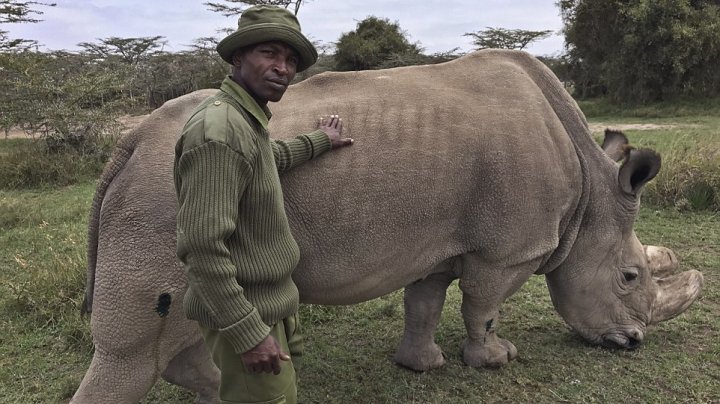Last male northern white rhino on earth has died in Kenya, aged 45
 foto: dailymail.co.uk/// AP
foto: dailymail.co.uk/// AP
The last male northern white rhino on earth has died in Kenya at the age of 45, leaving only two females of his subspecies alive.
The rhino, named Sudan, was suffering from a degenerative muscle and bone condition linked to age when keepers found he was unable to stand up and made the decision to euthanise him on Monday.
Sudan's demise should spell the end of his subspecies, but scientists have gathered genetic material and hope to develop IVF techniques to produce more white rhinos.
A statement from the Ol Pejeta Conservancy, where he was kept under armed guard to prevent poaching, said his condition 'worsened significantly' and he was no longer able to stand.
His muscles and bones had degenerated and his skin had extensive wounds, with a deep infection on his back right leg.
The rhino had been part of an ambitious effort to save the subspecies from extinction after decades of decimation by poachers, with the help of the two surviving females.
The northern white rhino population in Uganda, Central African Republic, Sudan and Chad was largely wiped out during the poaching crisis of the 1970s and 80s, fueled by demand for rhino horn in traditional Chinese medicine in Asia and dagger handles in Yemen.
A final remaining wild population of about 20-30 rhinos in the Democratic Republic of Congo was killed in fighting in the late nineties and early 2000s, and by 2008 the northern white rhino was considered extinct in the wild.
Sudan was named after the country of his birth, now South Sudan, and was captured in 1973 at around three years old before being taken to Dvůr Králové Zoo, in the Czech Republic.
But in 2009 he was moved to Kenya along with another male and two females - his daughter Najin and granddaughter Fatu - in an ambitious effort to save the species.
The rhinos were given a 90,000 acre pen which was watched over by armed guards 24 hours a day to prevent them from being poached.
Horn-embedded transmitters, watchtowers, fences, drones and guard dogs were also used to protect them.
'However, despite the fact that they were seen mating, there were no successful pregnancies,' the conservancy said.
While Sudan's death marks a turning point for the species, he has been technically infertile for years, meaning IVF has long been the northern white rhino's last hope of survival.
'He was a great ambassador for his species and will be remembered for the work he did to raise awareness globally of the plight facing not only rhinos, but also the many thousands of other species facing extinction as a result of unsustainable human activity,' said the conservancy's CEO, Richard Vigne.
Sudan was something of a celebrity, attracting thousands of visitors. Last year he was listed as 'The Most Eligible Bachelor in the World' on the Tinder dating app in a fundraising effort.
Rangers caring for Sudan described him as gentle and, as his condition worsened in recent weeks, expressed sadness over his imminent death.
The rhino 'significantly contributed to survival of his species as he sired two females,' the conservancy said.
'Additionally, his genetic material was collected yesterday and provides a hope for future attempts at reproduction of northern white rhinos through advanced cellular technologies.'
Sudan's death 'is a cruel symbol of human disregard for nature and it saddened everyone who knew him. But we should not give up,' said Jan Stejskal, director of international projects at Dvur Kralove Zoo in the Czech Republic.
'It may sound unbelievable, but thanks to the newly developed techniques even Sudan could still have an offspring.'
Northern white rhinos once roamed parts of Chad, Sudan, Uganda, Congo and Central African Republic, and were particularly vulnerable because of the armed conflicts that have swept the region over decades.
Read more on Dailymail